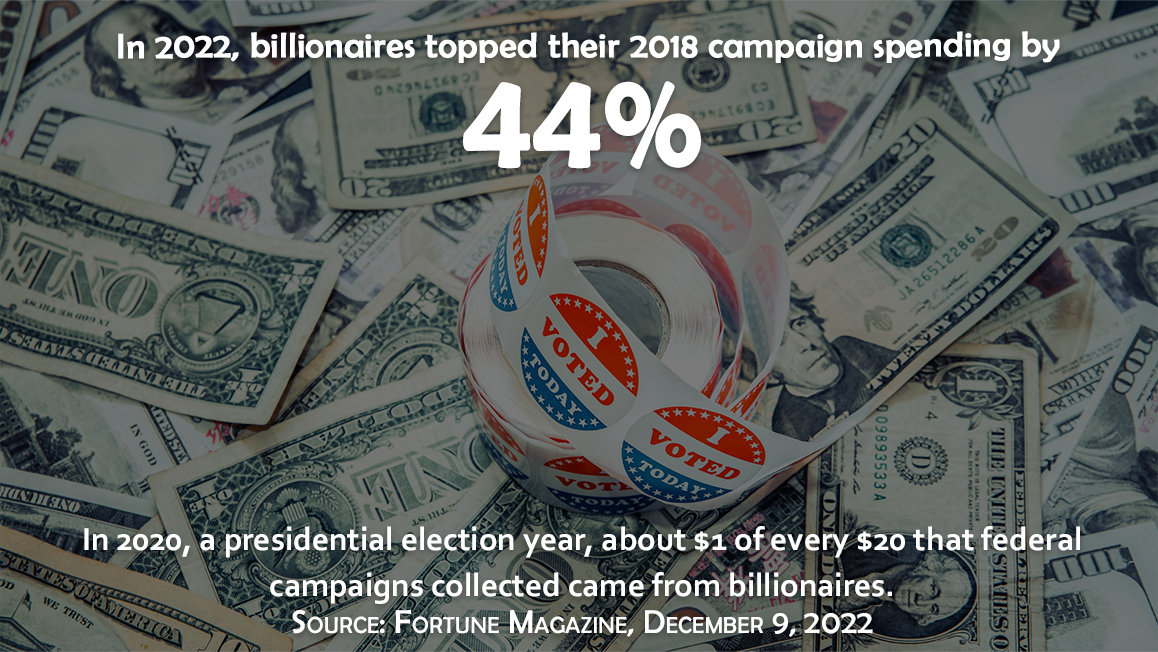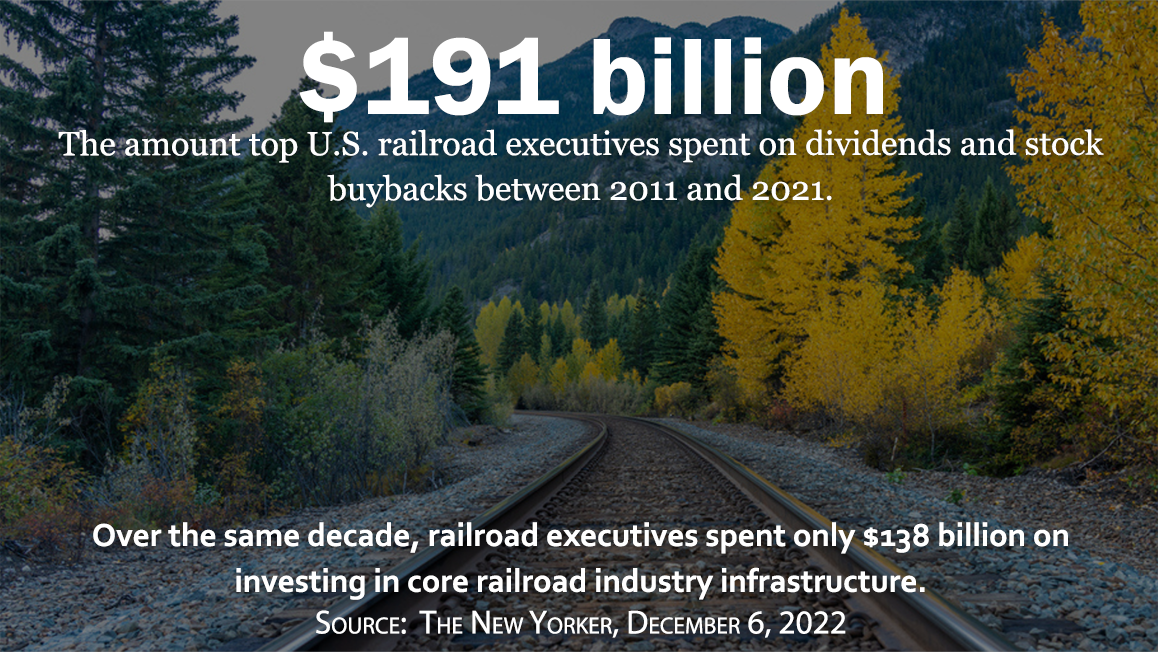| THIS WEEK |
So much for a quiet Sunday. Yesterday alone, Argentina won the World Cup crown, menorahs lit up for the first night of eight, and Elon Musk lost a Twitter poll asking if he should remain in charge of his shambolic company. (We’ll soon see if he actually takes the results seriously.)
Days like yesterday have been a dime a dozen in 2022, a year of non-stop upheaval and many electrifying political, social, and economic victories.
Our co-editor Sarah Anderson has just put together a handy round-up of this year’s top 10 inequality victories. Take a look below. A nice boost to helping us all exit 2022 on a high note!
This’ll be our last issue until 2023, but, in the meantime, you can catch up on previous issues chock-full of must reads and evergreen analyses. You can also let us know what you’d like to see more of in the new year simply by responding to this email.
Happy holidays from the Inequality.org team to you all!
Chuck Collins and Rebekah Entralgo,
for the Institute for Policy Studies Inequality.org team |
|
| |
|
| INEQUALITY BY THE NUMBERS |
 |
|
|
|
| |
|
| FACES ON THE FRONTLINES |
 |
| Looking Back: 2022’s Top 10 Inequality Victories |
Inequality.org co-editor Sarah Anderson has rounded up 10 of the most inspiring inequality victories of the past year. Number 1 on her list: the explosion of organizing activity at Amazon, Starbucks, and other workplaces once considered hopeless for unionization. Let’s all resolve in the New Year to support these workers as they strive to build on these wins and secure good contracts from their overpaid, anti-union bosses.
Number 10 on Anderson’s list: The rejection of the trickle-down myth, the decades-old theory that only tax loopholes for the rich and austerity for the rest of us can guarantee future prosperity. Americans aren’t buying that line anymore — and activists in 2022 notched big victories at the federal, state, and local levels that reflect this historic shift.
What 2022 victories ranked second through ninth? Click below to find out. |
|
| |
|
| WORDS OF WISDOM |
 |
|
|
|
| |
|
PETULANT PLUTOCRAT
OF THE WEEK |
 |
| This ‘Activist’ Stays Plenty Active — and Plenty Rich |
| What would life be like if you raked in nearly $2 million a day for an entire year? Ask Chris Hohn. This billionaire pulled down $690 million in dividends last year from the hedge fund he runs, on top of $479 million the year before. Hohn, the world’s richest person of Jamaican descent, holds a Harvard MBA and started his career on Wall Street. The 56-year-old currently does his hedge fund business out of London, but keeps his operation’s ownership in a Caribbean tax haven. Hohn’s TCI Fund has won kudos as the world’s “best-performing” hedge fund, and Hohn delights in his “activist” investor rep. Last month, he hammered Google parent Alphabet for paying employees too much — and not laying enough of them off. Alphabet, Hohn urged, should put its $116 billion stash of cash into stock buybacks, a maneuver that typically jacks up a company’s share price and enriches big-time investors — like Hohn. |
|
| |
|
| BOLD SOLUTIONS |
 |
| How Colombia Won a Landmark New Wealth Tax |
After three months of debate and negotiations, Colombian President Gustavo Petro achieved a major legislative triumph this past November when his nation’s lawmakers passed his ambitious tax reform bill. The ambitious centerpiece of this bill: a wealth tax.
Colombia currently rates as one of Latin America’s most unequal nations, with a top 1 percent holding $229.7 billion in wealth, 37.3 percent of the country’s total. The new tax impacts those Colombians with net worths of $600,000 or higher, a level 123 times the median Colombian adult wealth.
Less than 1 percent of Colombians hit that $600,000 level. According to our Inequality.org analysis, this wealth tax — combined with other provisions in the new bill — could raise $1.4 billion in revenue off Colombia’s 4,700-plus richest. Other nations worldwide can and should take notice. More from our researcher Omar Ocampo. |
|
| |
|
| GREED AT A GLANCE |
 |
|
|
|
| |
|
| TOO MUCH |
 |
| Can Talking About Inequality Leave Out Our Rich? |
| Over recent years, nations worldwide have been gathering at a series of confabs to hammer out what we all ought to be doing to save our planet and bring everyone on it up to a decent standard of living. These huddles, back in 2015, appeared to have scored a major breakthrough. That September, global heads of state met at the UN and announced they had “adopted a historic decision” on goals and targets that would by 2030 help “build peaceful, just, and inclusive societies” and ensure our Earth’s “lasting protection.” But that glorious promised end state now seems frighteningly distant. Researchers at the UN Research Institute for Social Development have released a bold new report that explains why the goals for 2030 world leaders set in 2015 don’t come to grips with the inequality that plagues us. Inequality.org’s Sam Pizzigati has more. |
|
| |
|
| MUST READS |
|
What's on Inequality.org
Chuck Collins, Joe Fitzgerald, Helen Flannery Omar Ocampo, Sophia Paslaski, and Kalena Thomhave. Silver Spoon Oligarchs: How America’s 50 Largest Inherited-Wealth Dynasties Accelerate Inequality. Supplement New York Magazine’s latest issue on “nepo babies” with our groundbreaking report from last year.
Elsewhere on the Web
Steve Dubb, Meet the New Global Tax Haven, the United States, Nonprofit Quarterly. An engaging look at the recently published Institute for Policy Studies report, Billionaire Enabler States: How U.S. States Captured by the Trust Industry Help the World’s Wealthy Hide Their Fortunes.
Steven Tufaro, Mississippi’s Mantra: Lower Taxes for the Rich; Shorter Lives for Everyone, Patriotic Millionaires. Mississippi’s governor is pushing to slash taxes on the state’s rich at the same time a newborn boy in Mississippi enjoys a shorter life expectancy than a newborn boy in Bangladesh.
Byron Guillot, Billionaires had an extra $1 trillion to influence the midterm elections. Save American democracy by taxing extreme wealth, Fortune. The case for a minimum billionaire income tax.
Jason Hickel, How much should inequality be reduced? Al Jazeera. If everyone on Earth had access to at least basic decency, new research shows, then a distribution that had our richest consuming at most six times that level would be compatible with achieving climate stability.
Liza Featherstone, NYC’s Proposed Private Helicopter Ban Is One of the Best Ideas in Years, Jacobin. Banning private nonessential helicopters would be a political and environmental masterstroke: curbing the wasteful narcissism of the rich, while improving life for everyone else.
Lisandro Perez-Rey, Why Billionaires Are Actually Ruining the Economy, Wired. A gripping, high-energy new video debunking of our age’s most toxic economic myths.
Sarah Moore Johnson, Raymond Odom, and Phyllis Taite, A Proposal to Repair Racial Wealth Disparity, American College of Trust and Estate Counsel. How tax policy has systematically shifted wealth to white households and why a wealth tax would be a powerful tool to correct wealth disparity.
William Hartung, Pentagon Profiteers: Executive Compensation In The Arms Industry, Forbes. The biggest five U.S. defense contractors paid their top two dozen execs $287 million last year.
Teddy Ostrow, Elon Musk’s Takeover Through The Eyes of Twitter’s Janitors, In These Times. We can’t let a billionaire, say fired union custodians, define what being able to support your family means.
|
|
| |
|
| A FINAL FIGURE |
 |
|
|
|
| |
|
| BE THE 1% (NO, NOT THAT 1%) |
 |
Our goal for 2022: that 1% of our Inequality.org subscribers become monthly sustainers and help grow our newsletter and research efforts. Be the 1%, for as little as $3 a month! |
|
|
|
| |
|
|